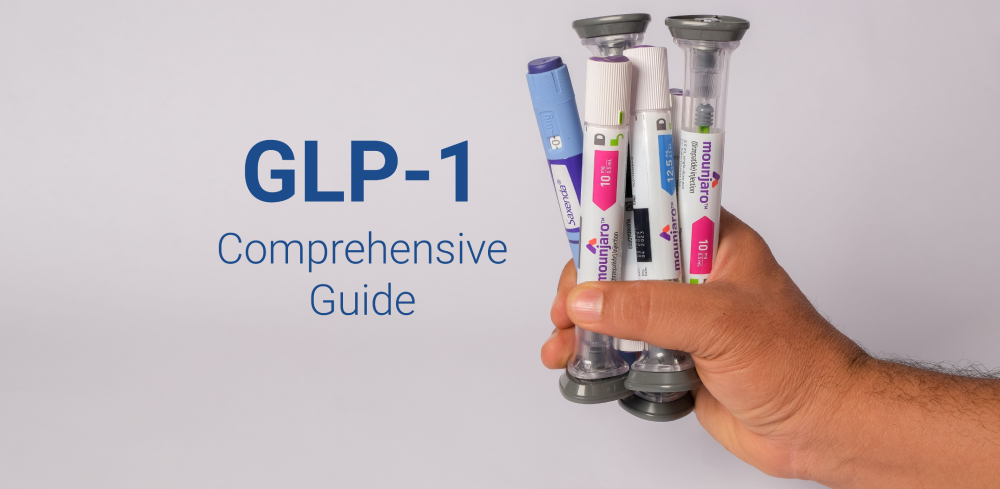
Updated May 31, 2024


Kristi Perry, PA-C
Eli Luft, PA-C
Key Takeaways
- 1. Lipotropic injections contain weight-loss supporting nutrients like B vitamins, carnitine, choline, and inositol.
- 2.They aid in energy metabolism and fat burning, complementing diet and exercise for weight loss.
- 3. Weight loss can be seen within 30 days when combined with proper diet and exercise.
- 4. Possible side effects include mild nausea, headaches, and injection site reactions.
- 5.The frequency of injections varies, typically once a week, based on individual needs and medical advice.
Introduction
Lipotropic injections are supplement injections used for weight loss. In fact, a lipotropic nutrient is any substance that affects fat metabolism in the body [1]. Lipotropic injections include a cocktail of weight-loss promoting agents, such as vitamin B12. Lipotropic injections are not meant to be a substitute for dieting and exercise, but they can be a complimentary approach to facilitate weight loss. In this article we will explore what lipotropic injections are, how they work, and what weight loss is like with lipotropic injections. Keep reading to find out more!
What are lipotropic injections?
Lipotropic injections are made up of a combination of several weight-loss supporting nutrients. Vitamin B12 is the most common of these nutrients, but other essential nutrients are used as well. For example, other B vitamins, carnitine, choline, and inositol are also used in lipotropic injections. These injections are usually given in the arm or another area containing more subcutaneous fat, such as the thigh, abdomen, or buttocks.
Do lipotropic injections work?
They key to lipotropic injections is that they contain ingredients known to promote energy metabolism. The major active ingredients found in lipotropic injections are vitamin B complexes, vitamin B12, carnitine, choline, methionine, and inositol.
-
Vitamin B Complexes: B1, B2, and B6 vitamins can all be found in lipotropic injections. These water-soluble vitamins enter the body easily and are best known for their metabolism-enhancing effects [2].
While the ingredients in lipotropic injections are important for energy metabolism and can support weight loss, to get the best results from them, you must keep up with your exercise and diet plan. Remember, lipotropic injections aren’t meant to work alone.
How long does it take for lipotropic injections to work?
On a biological level, the vitamins and nutrients found in lipotropic injections are absorbed quickly. However, it may take a while to notice their weight-loss effects. Whether you are following a diet and exercising will affect how long it takes for your lipotropic injections to work. Your body mass index (BMI) at the start of treatment will also affect how quickly you see results from lipotropic injections.
How much weight can you lose with lipotropic injections?
There have not been many studies done regarding how much weight you can lose with lipotropic injections. There are many factors that influence how much weight you can lose when taking lipotropic injections including your diet and what your activity level and exercise habits are. The efficiency of lipotropic injections, diet, and exercise are all linked. If you stick to all three, you may begin seeing the effects within 30 days.
How long does lipotropic injections stay in your system?
How long lipotropic injections stay in your system depends on several factors, such as your own personal metabolism and how often the injections are administered. In general, though, these injections last about a week or two.
Do lipotropic injections suppress appetite?
Lipotropic injections don’t necessarily work to suppress appetite. Rather, they enhance the energy metabolism processes that are needed when you are dieting and exercising. That’s why it’s important to make sure that you are exercising and dieting while on lipotropic injections.
What are the side effects of lipotropic injections?
Like any new supplement, there may be side effects that occur with lipotropic injections. Because everyone’s medical history is different, you should talk to your physician before beginning any new weight loss supplements or injections. Although side effects to the injections are rare, and they are generally well tolerated, it is possible that some people can experience mild adverse effects. Lipotropic injection side effects that can occur may include redness, swelling, and infection at the injection site. These symptoms should resolve quickly though.
Other lipotropic injection side effects include:
- Headaches and light headedness
- Stomach upsets such as mild nausea and mild diarrhea
Allergic reactions (itching, hives, shortness of breath, wheezing, swelling of the tongue, throat, or mouth) although rare, can also occur. Certain supplements may also have potential drug interactions.
How often should you get lipotropic injections?
How often you should get a lipotropic injection depends on the ingredients in the injection. Some ingredients shouldn’t be taken too frequently. That is why each weight loss clinic may follow a different protocol for the scheduling of lipotropic injections.
In some clinics, people receive lipotropic injections once a week, while other clinics suggest more frequent injections. This is something that you are your doctor will decide before you begin receiving treatments.
What is the difference between B12 injections and lipotropic injections?
The primary difference between B12 injections and lipotropic injections is that lipotropic injections contain several ingredients that work together to enhance energy metabolism processes, facilitate fat burning, and promote weight loss.

Lose Weight. Feel Great.
Rivas Medical Weight Loss is here to guide you
with expert care and top quality medication.
Book Appointment
Bibliography
- Best, C. H., M. Elinor Huntsman, and Jessie H. Ridout. “The lipotropic effect of protein.” Nature 135.3420 (1935): 821-822.
- “Office of Dietary Supplements – Vitamin B6.” NIH Office of Dietary Supplements, U.S. Department of Health and Human Services, ods.od.nih.gov/factsheets/VitaminB6-HealthProfessional/.
- “Office of Dietary Supplements – Vitamin B12.” NIH Office of Dietary Supplements, U.S. Department of Health and Human Services, ods.od.nih.gov/factsheets/VitaminB12-HealthProfessional/.
- Baltaci, Davut, et al. “Association of vitamin B12 with obesity, overweight, insulin resistance and metabolic syndrome, and body fat composition; primary care-based study.” Med Glas (Zenica) 10.2 (2013): 203-210.
- “Office of Dietary Supplements – Carnitine.” NIH Office of Dietary Supplements, U.S. Department of Health and Human Services, ods.od.nih.gov/factsheets/Carnitine-HealthProfessional/.
- Center, S. A., et al. “The clinical and metabolic effects of rapid weight loss in obese pet cats and the influence of supplemental oral L‐carnitine.” Journal of veterinary internal medicine 14.6 (2000): 598-608.
- Blusztajn, Jan Krzysztof. “Choline, a vital amine.” Science5378 (1998): 794-795.
- Yu, Danxia et al. “Higher dietary choline intake is associated with lower risk of nonalcoholic fatty liver in normal-weight Chinese women.” The Journal of nutrition vol. 144,12 (2014): 2034-40. doi:10.3945/jn.114.197533
- Elsawy, Gehan, Osama Abdelrahman, and Amr Hamza. “Effect of choline supplementation on rapid weight loss and biochemical variables among female taekwondo and judo athletes.” Journal of human kinetics 40 (2014): 77.
- Bevilacqua, Arturo, and Mariano Bizzarri. “Inositols in Insulin Signaling and Glucose Metabolism.” International journal of endocrinology vol. 2018 1968450. 25 Nov. 2018, doi:10.1155/2018/1968450
- Tabrizi R, Ostadmohammadi V, Lankarani KB, et al. The effects of inositol supplementation on lipid profiles among patients with metabolic diseases: a systematic review and meta-analysis of randomized controlled trials. Lipids Health Dis. 2018;17(1):123. Published 2018 May 24. doi:10.1186/s12944-018-0779-4





